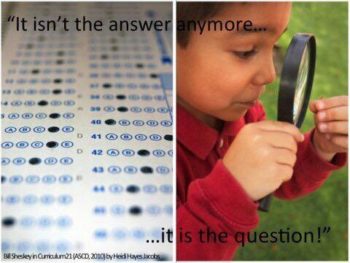The Importa nce of Educational Assessment
nce of Educational Assessment
Parents often ask us how they can use assessment data to support their children’s learning. Think of assessment as a quilt whose pieces include standardized test results, classroom measures, report cards, and other information on your child’s learning. These quilt pieces should come together to support each student’s academic success.
There are a lot of state and federal rules about testing and measuring students’ academic performance. Regardless of these mandates, parents must receive ongoing updates on their children’s academic progress to provide added support at home. Parents should ask teachers how they gather information about learning and respond to lingering gaps. And, how can they help their children?
What Questions Should You Ask Your Child’s Teacher?
 Assessment is less about standardized tests and more about strategies that teachers use every day to check on progress and make learning visible. Here are some questions to ask your child’s teacher and school:
Assessment is less about standardized tests and more about strategies that teachers use every day to check on progress and make learning visible. Here are some questions to ask your child’s teacher and school:
- What kind of tests do you give and how often do you test?
- How do you use the test data?
- In addition to tests, how else do you find out what students know and can do?
- How do you use ongoing daily assessments to confirm what students know during various learning activities?
- How do you involve students in their own assessment of learning?
- How do you and they know what to do next if students are not making sufficient progress?
What Impact Can You Have On Your Child’s Learning?
Parents are the primary teachers of their children. Additionally, parents are the greatest influence on their children’s academic success. By monitoring and supporting their children’s achievement throughout the school year all children can achieve their best.
Laura Greenstein, Ed.D. Author, GenParenting.com Guest Blogger, and Founder of the Assessment Network www.assessmentnetwork.net
Edited by Mary Ann Burke, Ed.D.
Copyright © 2017 by GenParenting

Laura Greenstein has been an educator for over 30 years serving as a teacher, department chair, and school leader in multiple grades and subjects. She combines this background with her experience as a school board member and professional development specialist to bring fresh and original ideas to educators about teaching, learning, and assessing. She consults with schools and districts and presents at workshops and conferences locally and nationally. As an adjunct professor at the University of Connecticut and the University of New Haven, she teaches Human Development and Assessment to undergraduate and graduate students and more recently, Teaching, Learning, and Assessing with Technology in the 6th year Digital Literacy program. She has a B.S. from the University of Connecticut, an M.S. from the State University of New York at Oneonta in education, a 6th year from Sacred Heart University in administration, and an Ed.D. from Johnson and Wales University in Educational Leadership. Her website, http://www.assessmentnetwork.net, is a valuable source of information on issues and topics in assessment. She is the author of multiple books on assessment including What Teachers Really Need to Know About Formative Assessment, Assessing 21st Century Skills: A Guide to Evaluating Mastery and Authentic Learning, Restorative Assessment: Strength-Based Practices to Support all Learners, and Sticky Assessment: Classroom Strategies to Amplify Student Learning.

